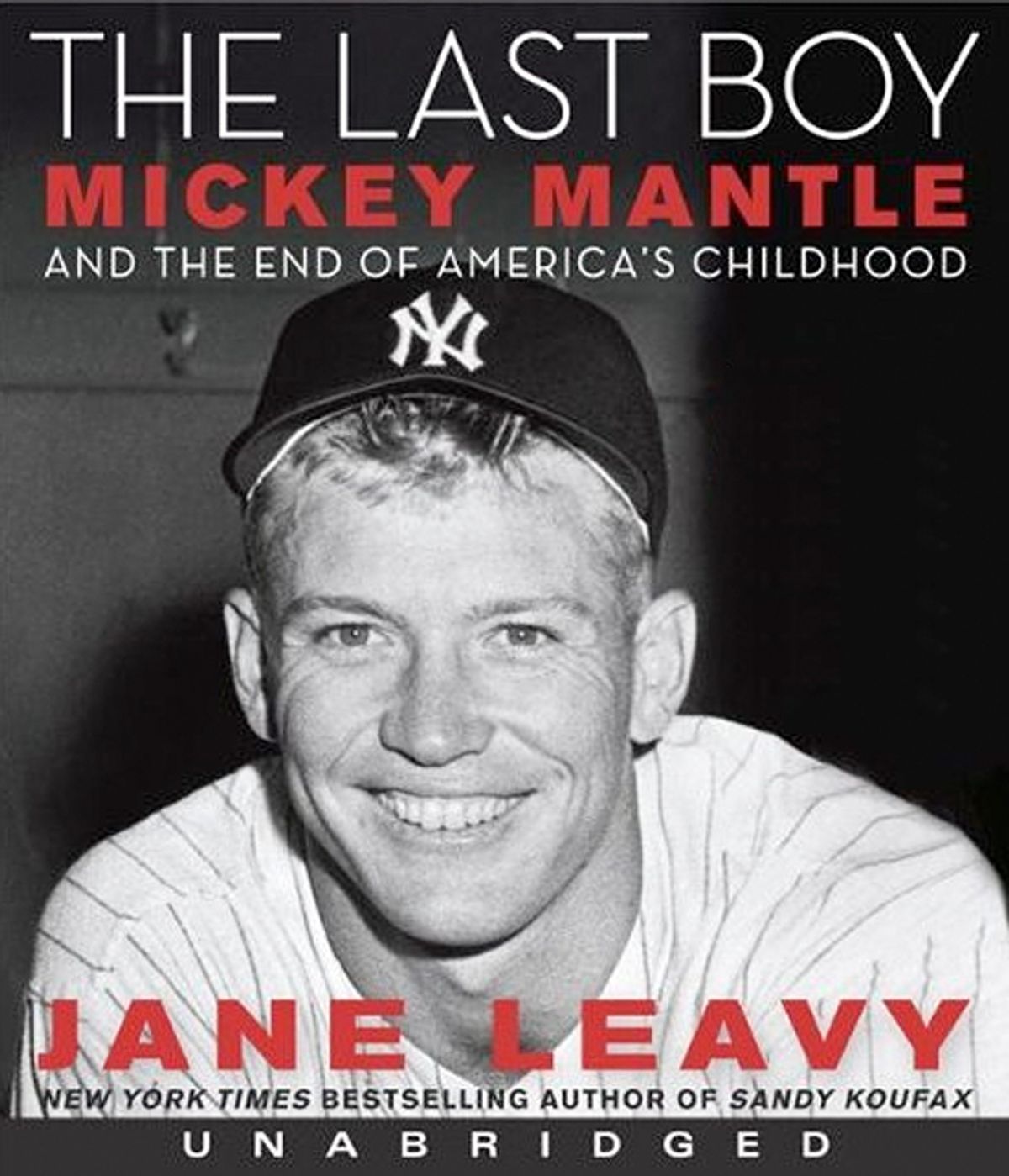Mickey Mantle's image looms over American sports like a golden god from a time only dimly remembered but still strongly felt. He was the consummate blend of power and speed ever to play baseball (he was clocked going from home to first base at 3.0 seconds, the best time of his era), his prodigious 500-foot blasts creating the term "tape measure home run." He was also, with an assist from his exact contemporary, Willie Mays (the player with whom he was destined to be compared to and contrasted with), the creator of baseball nostalgia, the king of the card show-autograph circuit.
Jane Leavy, author of a superb baseball novel, "Squeeze Play," and the best-selling "Sandy Koufax, A Lefty’s Legacy," zooms right in on the essence of Mantle's appeal in "The Last Boy: Mickey Mantle and the End of America's Childhood." He was the last boy in the last decade ruled by boys. He was L'il Abner in a posse of dreamy reprobates: James Dean, Buddy Holly, Frankie Avalon, Dean Martin, Elvis. Women wanted to have them or mother them, young men aped them, while behind the scenes, elders and handlers tried to tame them."
Mantle has inspired several fine biographies over the years, including David Falkner's "The Last Hero: The Life of Mickey Mantle" (1995) and Tony Castro's "Mickey Mantle: America's Prodigal Son" (2002), and Mickey himself coauthored several highly readable memoirs, most notably "The Mick" (1985), which kicked off the resurgence of interest in Mantle and his career. Leavy, though, brings an insight to Mantle's story that previous writers, including Mickey himself, lacked -- namely, a personal insight into the blond, self-destructive former Adonis.
Late in his life, when Mantle resembled an alcoholic train wreck, Leavy spent several hours with her childhood idol trying to interview him. She failed to get much that was usable at the time, but nearly three decades later, the encounters paint a vivid picture of Mickey and his twilight years -- a pathetic, broken, self-deprecating middle-aged man baffled by people's adoration.
"Oh, well," he said cheerfully after Leavy rebuffed his advance at an Atlantic City hotel, "y'know what they call me, doncha?"
"'No, Mick, I don't.' 'Well,' he drawled, 'they call me Mighty Mouse, because I'm hung like him.' I went up to my room and cried."
Mickey Mantle made a lot of people cry in his 64 years. The son of an Oklahoma zinc miner, Mickey was groomed practically out of the cradle to play ball and thus escape the brutal and dangerous mines. No ballplayer was ever given greater natural talents and worse luck. His father, grandfather and uncle, miners all, died premature deaths. Mickey, who began drinking at an early age, became, like the men on his mother's side of the family, an alcoholic; contracted the bone disease osteomyelitis from a high school football injury; when the draft board ruled him 4-F because of the disease, he received hate mail by the thousands accusing him of being a draft dodger.
At the Yankees spring training camp in 1951 he was hailed as the second coming of Babe Ruth and Joe DiMaggio combined. The expectations put on the 19-year-old were ludicrous; in retrospect, it's almost scary how close he came to fulfilling them. The second game of the 1951 World Series with the New York Giants was, writes Leavy, "the last time Mantle set foot on a baseball field without pain." Chasing a fly ball hit by -- quel irony! -- Willie Mays, Mickey got his cleats tangled in an open drain pipe, tore up his knee and, from then until his retirement after the 1968 season, was plagued with injuries.
It seemed at time there were two Mickey Mantles, the one who, from the early 1950s through 1964, was the best player in the American League and the one most sportswriters thought he could have been. He won three Most Valuable Player Awards, and in the opinion of baseball analysts, could justifiably have won three or four more. As his teammate Clete Boyer put it, "Jesus Christ, how much better could he have been?" He was berated almost his entire career by skeptical writers, hostile fans and even his own manager, Casey Stengel, for his reticence; Jackie Robinson scolded Mantle's critics after Mickey destroyed the Brooklyn Dodgers in the 1952 World Series, telling a reporter, "We got plenty of guys that stupid, but we don't have anybody that good."
Part biography, part memoir, and part fan's note, "The Last Boy" is the most complete book ever about Mantle, the one that puts his career into best perspective as well as the one that deals most openly with his failures as a husband and father. Mickey was the world's greatest teammate: "Rookies or veterans, slumping teammates, got invitations to dinner. You come with me tonight." But he drove his wife, Merlyn, his childhood sweetheart back in Oklahoma, to drink and despair with his constant womanizing and allowed his four sons to sink into alcoholism with him.
Leavy accomplishes the astonishing feat of capturing Mickey's big-heartedness without ever slipping across the foul line into sentimentality. She records Mantle's sins and achievements with the diligence of a first-rate reporter, never losing sight of what drew her to Mickey as a fan in the first place: "He had a lonely heart and it was a good heart and it was open and big," says a woman who knew Mantle for more than 50 years. It was a heart big enough to make everyone who knew him look past his transgressions.
In the final analysis, Leavy remains a fan, and in the process makes fans of us all.

Shares